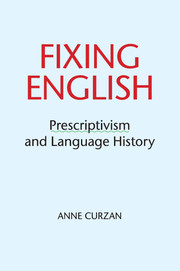Book contents
- Frontmatter
- Dedication
- Contents
- List of figures
- Acknowledgements
- Introduction: does prescriptivism fail?
- 1 Prescriptivism’s umbrella: standards, style, restoration, and political intervention
- 2 Prescriptivism’s lessons: scope and “the history of English”
- 3 Checking grammar and grammar checkers
- 4 Dictionaries and the idea of “real words”
- 5 Nonsexist language reform and its effects
- 6 Reappropriation and challenges to institutionalized prescriptivism
- 7 Finding shared ground: public conversations about prescriptivism
- References
- Index
2 - Prescriptivism’s lessons: scope and “the history of English”
Published online by Cambridge University Press: 05 July 2014
- Frontmatter
- Dedication
- Contents
- List of figures
- Acknowledgements
- Introduction: does prescriptivism fail?
- 1 Prescriptivism’s umbrella: standards, style, restoration, and political intervention
- 2 Prescriptivism’s lessons: scope and “the history of English”
- 3 Checking grammar and grammar checkers
- 4 Dictionaries and the idea of “real words”
- 5 Nonsexist language reform and its effects
- 6 Reappropriation and challenges to institutionalized prescriptivism
- 7 Finding shared ground: public conversations about prescriptivism
- References
- Index
Summary
Lynne Truss’s book Eats, Shoots & Leaves: The Zero Tolerance Approach to Punctuation was published in November 2003 by the small press Gotham Books, and it became a runaway bestseller, to everyone’s surprise. It sold over two million copies in its first two years, and it won the book-of-the-year prize at the British Book Awards. In those first couple of years, the book was a popular gift for English majors and other literary types, as both undergraduate and graduate students in my courses have attested. It also appears that, according to my informal polling, some significant number of the recipients never read the book. This phenomenon raises a tree-falling-in-the-woods kind of question: If a wildly popular prescriptive English usage guide sells millions of copies but significantly fewer people actually read it, is it an important part of the history of the English language in the modern period?
I will argue here that it is an important part of the history of English: its popularity alone speaks to language ideologies and attitudes at play at the beginning of the twenty-first century, which are part of the history of a language; in addition, popular usage guides as well as the attitudes circulating around them have the power, in some instances, to influence English as it is spoken and written. Before developing that argument, though, it is useful to consider two possible counterarguments.
- Type
- Chapter
- Information
- Fixing EnglishPrescriptivism and Language History, pp. 41 - 63Publisher: Cambridge University PressPrint publication year: 2014



